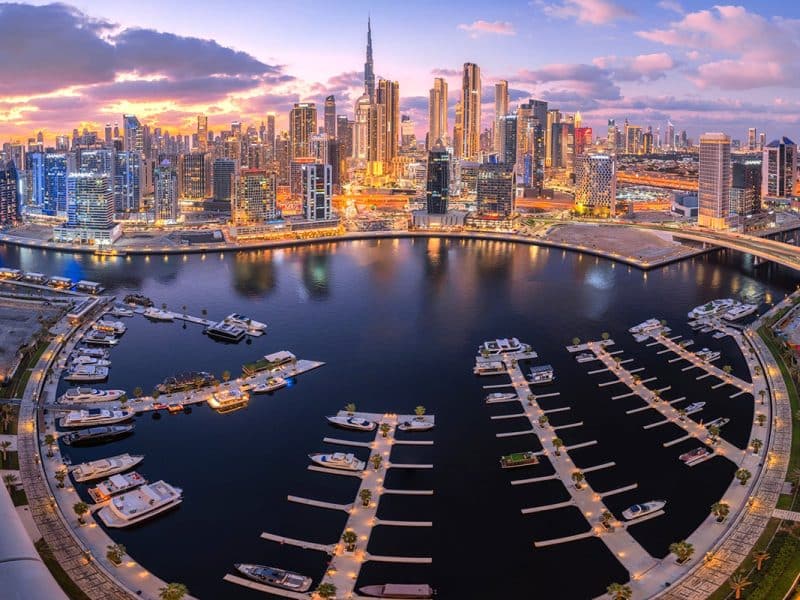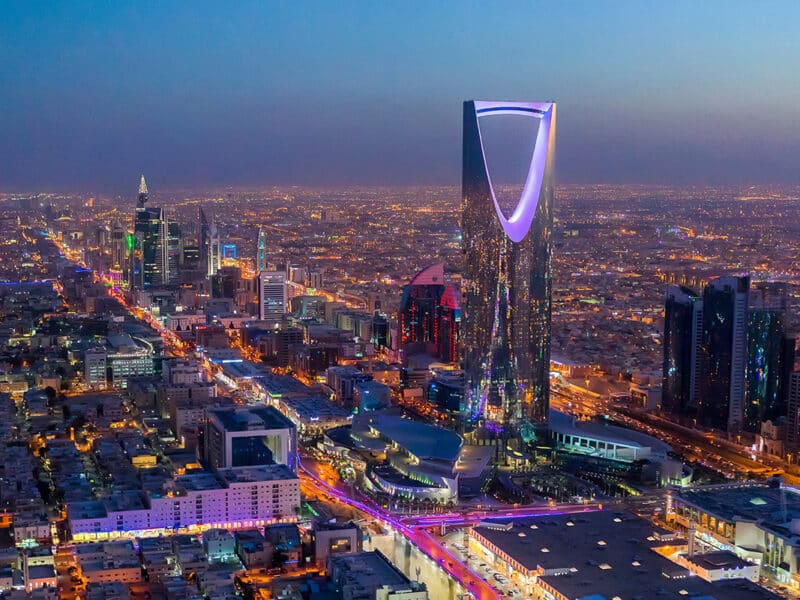He has barely stepped foot in the door and the company he has come to take the reins of is yet to open a store. But Nick Peel is making a bold promise.
“I’m entirely confident we’ll be in profit by the end of 2015,” the CEO of retail start-up Marka tells Arabian Business.
His comment is made even more audacious by the fact that Marka was only publicly listed in September last year; failing to fulfil his statement could sink the price of its shares, almost half of which are owned by some of the most prominent businessmen in the UAE.
But chances are his words will ring true. Since its greenfield listing on the Dubai Financial Market (DFM) in September, Marka has signed acquisitions and franchise agreements with at least ten brands and is in “advanced” talks with nearly as many more.
While those deals have siphoned much of the original cash investment of AED500m ($136m), Peel says each of the brands, across sportswear, food and beverage and fashion, will immediately generate large revenues at a modest profit margin.
The standout is expected to be Retail Corp. Marka bought the sportswear store for AED220m ($60m) in December and is expected to takeover full ownership by 1 April. After some changes and expansion, Peel expects revenue of at least AED200m this year.
“Retail Corp will automatically drive us into profit,” he says.
Marka’s food and beverage lineage will kick-start with the world’s first Harper’s Bazaar Café and Taste of Italy by Heinz Beck casual restaurant, having partnered with the global fashion magazine and the Michelin-starred chef. Both are due to open in spring — at Dubai Design District (d3) and The Galleria on Al Wasl Road, respectively — and will be the first of a chain.
Last week, Marka also announced it was creating a unique retail-hospitality concept with UEFA Champions League to open in Yas Mall on Yas Island, Abu Dhabi, in May. Customers will be able to dine in a stadium-designed setting while watching live matches or archive footage of highlights on giant screens, or shop in one of the shop-in-shops selling merchandise from UEFA teams, including signed items.
On the fashion front, Peel says Marka has signed seven franchise deals but so far it is only revealing football star Cristiano Ronaldo’s new footwear collection, CR7, of which Marka will be the exclusive franchisor in the GCC.
All seven, Peel says, are niche European fashion brands emerging within their own markets and already very cash generative with a high profit margin. Most target women but all are high quality, affordable designer.
“They’re not luxury end, they’re affordable. We’re quietly confident that we can create these niche brands and drive exceptional value,” Peel says, adding that at least half-a-dozen more deals will be signed during the first half of the year.
Not only does Marka have some of the world’s most iconic brands under its belt, its founders are 151 of the most successful businessmen in the UAE. They originally kicked in 45 percent of the company’s cash, the maximum allowed under DFM regulations.
Marka shares were 36 times oversubscribed when it launched on 25 September amid a booming retail sector and economy in the UAE.
Brushing aside the fact it was the first initial public offering on the DFM in five years in a strong economic market, Peel says the early attraction to Marka was a combination of the reputation of the men behind it and the business strategy.
“There’s no doubt that until we assume a retail trading position and we acquire some businesses and launch some business our reputation and credibility has rested heavily on [our] six board members and 150 founders,” Peel, whose 20 years’ experience in retail is mostly in the UK, says.
“I honestly [also] think… people know and intuitively understand that sport, food and beverage and fashion are three core pillars in the economic landscape of the UAE and there’s scope for growth, so I think [Marka’s] strategy has been well communicated, well received and the market, in particular when you align it with the founders and the board directors, buy into it.”
Marka’s shares shot up 59 percent on listing and are still up 26 percent compared to the IPO price.
The company’s initial focus will be solely on the UAE, moving worldwide within a few years. But rather than take over the UAE retail scene, Peel says Marka will contain itself to hand-picked brands it can take globally.
“We have no aspirations to be the biggest in the region,” he says. “We have no aspirations to secure and work with 50, 60, 70 brands like an Alshaya.
“I think where we can create a point of difference is by maintaining our pioneering approach to retail… by continuing to be agile, nimble [and] relatively fast moving.
“We don’t have the bureaucracy that maybe restricts some of our competitors in this marketplace and we truly believe, with whichever brands we discuss and move forward with, we truly believe in partnership. There’s a lot of people that talk that story, I think there’s very, very few that deliver on it.
“We’ve been deluged over the last two to three months with approaches from within the region [and] from international brands,” Peel says. “[But] right now our focus is the UAE years one and maybe two, [then] the wider GCC years two to three. We will truly have between four and five brands that have international opportunity and scalability but we [will] only attack the international market in years’ three to five.”
Peel says he is in discussions with “a couple” of existing concepts that in the future could “certainly play in America, Europe and particularly Asia”.
Marka is hand-selecting F&B outlets and retail operators it believes have significant potential but are presently stuck, either because of a lack of management experience or finances. “They’re chains or brands that are in need of some TLC [tender, love and care], some cash investment,” he says.
“We’re looking at modest-sized businesses that are already delivering, almost without exception, very, very strong revenue and EBITDA but they’re in need of investment, management team are in need of some expertise and we genuinely believe that we can come in, inject in some cases some cash, certainly inject man expertise, but I think more importantly scale these businesses relatively quickly.
“So it fits in that incubator approach where we work inside these brands and see if we can drive them from a local market.”
Beyond acquisitions, Marka also is developing its own concepts, both individual brands and stores, including the UEFA Champions League Experience. But Peel has a firm “no comment” when asked if he is in direct negotiations with a specific football club or player.
The prospect is not far-fetched; Peel was retail manager for English Premier League team Arsenal for two years, and the managing director of Marka’s sports division, Mike Thompson’s experience includes single-handedly building Freddy, an Italian women’s active wear label that is now in 30 countries, as well as running the self-titled sportswear fashion label of Italian tennis star Sergio Tacchini.
Peel makes no secret that football will be one of three key areas of focus within the sports division, the other two being cycling and women’s active wear.
Football clearly has a worldwide audience worth billions. Middle East investors, mostly from the UAE and Qatar, have spent $1.5bn in recent years buying or sponsoring multiple European football clubs, according to sports marketing research company Repucom.
However, Peel says in his opinion there are only four football clubs that have “true global reach and appeal”: Real Madrid, Barcelona, Manchester United and AC Milan.
“Experience tells me [from] my time at both clubs, particularly Arsenal, that there were very few elite, global football brands that can travel internationally,” he says.
“Some are national brands that think they’re international; some are international brands that don’t know quite how to monetise and commercialise their brand equity.”
He does not even rate his former club Arsenal among them.
“Where I position something like Arsenal on the branding piece is they have scope to grow,” he says.
Peel says sport, as well as food and beverage, will initially dominate Marka’s revenue and EBITDA stream but he won’t commit to a proportion from each of the three divisions on any time scale.
“We’re not sat here with any rigid approach that says sport has to be 30 percent and food and beverage has to be 50 percent. We can make acquisitions and franchise deals that suit us at whatever point in time,” he says. “I would expect our business model to flex over time.”
Marka also may branch into non-bricks-and-mortar opportunities that can help boost its core focus. Particularly in the sports vertical, Peel won’t rule out any type of acquisitions or franchises.
“We’re a retail, consumer-facing holding company but it’s very important we also have some resource expertise in the e-commerce space and I wouldn’t rule out even a B2B business in the medium-term, providing the sports brand that we’re associated with had opportunity to play across a number of channels,” he says.
The digital channel is of particular interest and an area Peel says Retail Corp would have first-mover advantage.
“We think some of the current players in sport within the UAE and the region are a little bit slow and a little bit behind the eight ball when it comes to digital execution,” he says.
There also is plenty of scope to improve on customer service, product categories and diversification within sports retail, he says.
Marka bought Retail Corp from Istithmar World Holdings, a subsidiary of Dubai World that went into voluntary liquidation on 12 January. Peel, who was not heavily involved in the negotiations to purchase Retail Corp, says he does not believe Istithmar’s financial position created a bargain sale.
“I certainly don’t think it was a fire sale. I think we paid a fair price,” he says.
“From what I can see, relative to revenue and EBITDA we paid a fair price. And I think the most important thing … is we just see great potential with the Retail Corp existing business to grow organically; we see six or seven different areas where we think we can drive double-digit growth.
“We’ve sat here with a battle plan with 7-8 touch points — retail dynamics where we’re entirely comfortable that we can drive double-digit growth from. The key question will be how much growth can we drive but we’re very — we’re super — excited about the opportunity by Retail Corp. The opportunity for taking this thing to the next level is substantial.”
Marka has been “burning through some cash” as it buys up acquisitions and implements the new businesses but Peel says the company expects to still be in a positive cash position at the end of the year. It is using a combination of cash and debt, with “very creative” approaches to each deal.
“I think the best way of describing this is, there will be an element of cash, there will be an element of debt but I mean it when I say there will be a very clear solution to each individual case,” Peel says. “We want to have a pretty creative solution to financing… it might be a slightly different approach dependent upon the ownership structure or the nature of the business, so it’s not a cookie-cutter approach.”
Retail operating costs are much higher in the UAE than his homeland, Peel says, but Marka is playing in three verticals where there is “a very reasonable” margin on return.
“What everything will come back to here is, if we transition from start-up to retail trading company it will be about normal retail dynamics — running every store on a mini P&L [profit and loss] basis. It will be looking at variable costs, so our property costs, our staff costs, our marketing costs…
“I think the danger in this market is going for a fixed-cost approach, where truthfully, until you find out how you’re trading [is dangerous]. The variable-cost model approach to running a retail business, frankly, is the only way I know how to run a retail chain.”
Marka has been in discussions with the UAE’s department stores in regards to stocking its brands and Peel says there is plenty of enthusiasm. However, he is studying alternative retail locations outside of the mega malls, such as community centres and small shopping strips.
He says developers’ “build-it-and-they-will-come” mentality has worn thin and they are now more carefully targeting and scaling their retail concepts.
“Let’s make an assumption that department stores are seeing flat footfall year-on-year and inevitably as new retail real estate opens up it steals from somewhere, it does dilute to some degree,” Peel says.
“I think what tends to happen is new retail real estate opens and it takes a period of time for shopping habits to settle; you go and try the new kid on the block but if you’re still happy and you still know that Dubai Mall or Mall of the Emirates has got three brands that you can’t do without and they’re not situated anywhere else you might not go weekly but you might [still] go fortnightly or monthly.”
More than 75 million people visited Dubai Mall alone in 2013 and that figure was expected to rise by a double-digit percentage during 2014.
Overall, the UAE’s retail sector is expected to grow by more than 33 percent this year, according to a report by Ventures Middle East released in September.
“This place is not entirely depending on oil; retail is building, it’s an integrated approach, it’s kind of inter-dependent on tourism, we’re seeing population growth, we’re seeing residential property, retail property, we see this very, very strong entrepreneurial approach, airport growing… I think there are a number of touch points that would suggest to me… certainly for the next 18-24 months the retail economy is on a very, very strong footing,” Peel says.
Peel, who was headhunted for the CEO role, was previously the UK country manager for designer outlets managing firm McArthur Glen, with £600m ($905.4m) of assets. Prior to that he was retail director of English Premier League club Arsenal, following on from a similar role at Scotland’s Rangers Football Club.
He says he had turned down previous offers to run companies in the GCC.
“I didn’t fancy working for privately owned companies,” he says. “What really, really impressed me and sold me this time round was first and foremost the IPO listing — corporate governance was a big, big part of the attraction.
“Secondly, I was lucky enough to meet with some of the board directors, including Khaled Al Muheiri [founder and CEO of investment firm Evolvence Capital, which has more than $1bn in assets under management, including in retail], who did a lot of the brand acquisition and the start-up deals were his brain child. I tapped into his enthusiasm and pioneering, entrepreneurial approach to this market.
“And then I did my own diligence; I came out here with my wife and kids, we had a look around. It was obvious that markets were recovering [and] confidence was high.
“When you put those three things together, it’s a pretty compelling story.”
As a key author of that story, if Peel’s blurb is to be believed it seems all we have seen of Marka so far is the introduction.









